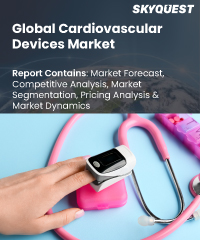
Report ID: SQMIG35E2016

Report ID:
SQMIG35E2016 |
Region:
Global |
Published Date: February, 2024
Pages:
157
|
Tables:
91 |
Figures:
76
Cardiovascular Devices Market Driver
Rising Cardiovascular Disease Incidence
Technological Progress and Innovation
Restraints
High Cost of Advanced Equipment
Complex Legal Challenges and Approvals
Our industry expert will work with you to provide you with customized data in a short amount of time.
REQUEST FREE CUSTOMIZATIONWant to customize this report? This report can be personalized according to your needs. Our analysts and industry experts will work directly with you to understand your requirements and provide you with customized data in a short amount of time. We offer $1000 worth of FREE customization at the time of purchase.

Report ID: SQMIG35E2016